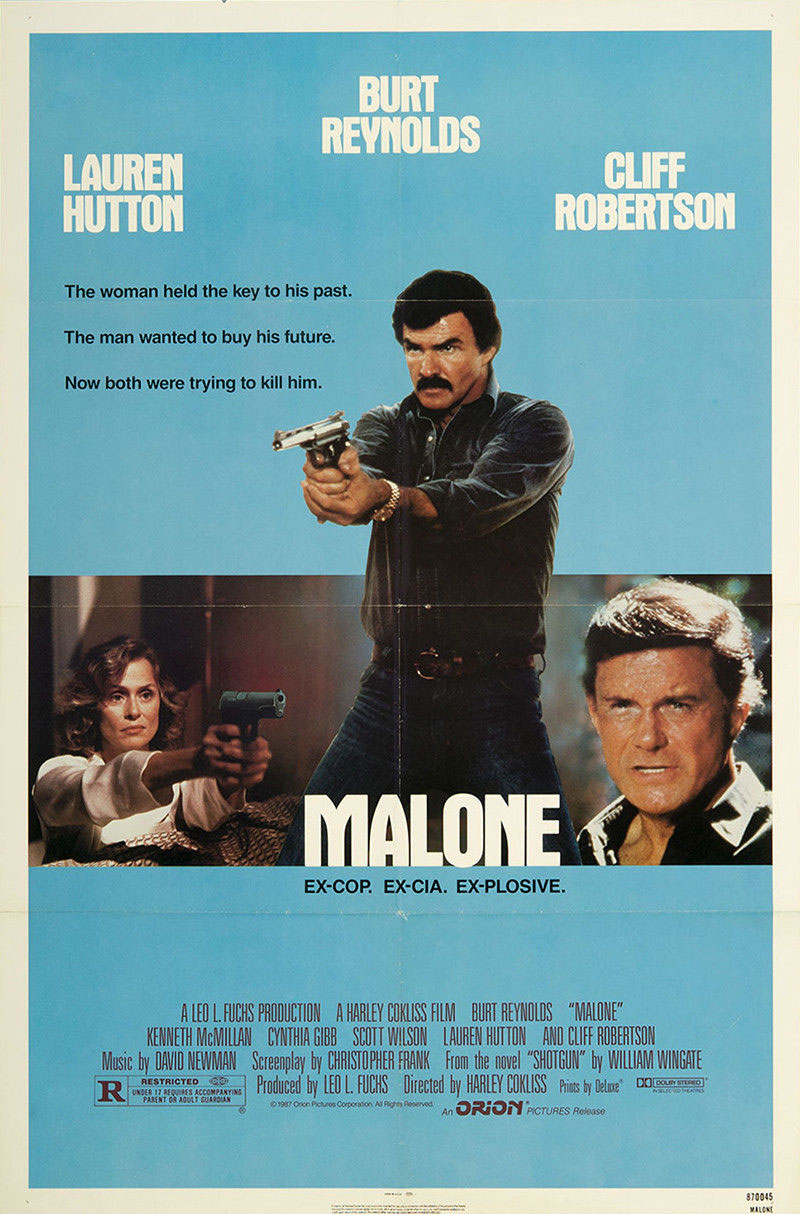Burt Reynolds was paid three million bucks to star as the titular character in 1987’s Malone. He didn’t seem all that impressed with the project, however. Of it, he said, “Let’s be honest. The film is Shane. [Malone] attempts to battle a Lyndon LaRouche character.” He continues, “Just to show you how movies change, Gerard Depardieu and Christopher Lambert at one point were going to play Malone. I wonder how this guy got rewritten into me.” How, indeed? Reynolds may have thought of this film as little more than a Shane ripoff, but I prefer to think of it as Road House without the fun.
An adaptation of the novel Shotgun by William Wingate, Malone was directed by Harley Cokeliss from a screenplay by Christopher Frank. Malone, the character, is a CIA assassin who is burnt out. His last two missions ended in failure when he was unable to pull the trigger. Malone wants out. But, as we all know from watching a myriad of movies featuring a hitman, there is no such thing as ‘out.’ Malone gives it a shot, anyway.
He finds himself stranded in a small town in the fictional Comstock River valley in eastern Oregon (played by Hedley, British Columbia) after his car breaks down. There, he befriends mechanic Paul Barlow and his teenage daughter, Jo (Scott Wilson and Cynthia Gibb). Being the 1980s and the middle of nowhere, Malone will  have to hang around for a few days before the parts for his car arrive. In the meantime, Malone gets involved in the affairs of the locals.
have to hang around for a few days before the parts for his car arrive. In the meantime, Malone gets involved in the affairs of the locals.
All of them are being pressured to sell their land to the film’s bad guy, Delaney (Cliff Robertson). Usually in a flick like this, the baddie has a plan to make a pile of dough at the expense of the locals. Delaney’s vision is a little grander than that. He’s a white nationalist, claiming to be part of a nationwide movement of rich and powerful men who have been given the task of creating racially pure redoubts across the nation. The Comstock valley is Delaney’s assigned turf.
That makes Delaney more evil than Rufus Ryker from Shane. Even Brad Wesley from Road House was just a gigantic asshole. Delaney is downright dangerous, especially as he has enough money to be taken seriously by people in Washington.
As happens in flicks like this, Malone ends up siding with the townsfolk, and entering into open battle with Delaney and his henchmen. This, and Malone’s interactions with the Barlows, are the meat of the film. It being so familiar, viewers will have to look with a more scrutinizing eye than normal to find anything unique.
Luckily for us, then, we have what appears to be a disgruntled star. The check must have cleared before shooting, because Burt looks like he wants to be anywhere else but in this film. Yet, he’s exactly what this reviewer wanted.
Burt’s hairpiece is perfect, his dentures are gleaming white, his push broom trimmed. He takes the mysterious stranger act to ridiculous heights, answering every question about who he is and where he comes from with a single word and a tough guy glare. He’s so gruff and unrepentant that Paul Barlow would have been well within his rights to tell this rude sonofabitch to head on down the road and find some other garage. Instead, he invites Malone to stay in his home. And this happens after his daughter starts making puppy eyes at Malone.
Eventually, after conflict here and there, the film ambles into a third act showdown, but only after Delaney made the mistake of making things personal. It ends exactly as one would expect.
The biggest problem in this film is that it is cliché from beginning to end, but doesn’t wallow in it enough. Sure, Burt’s performance, and its total lack of awareness, has its moments here and there, but the total package is missing the absurdity that can make a movie like this special. It’s slipping through the cracks of film history because, for the most part, it is profoundly uninteresting, starring a man who was profoundly uninterested in the material. His instincts were right.
For being boilerplate, and contributing little to the art of shitty cinema, I cast Malone into the middle purgatory of the Watchability Index, along with the rest of the forgettables. Move over, Alien Warfare — there’s a new #213 in town.
